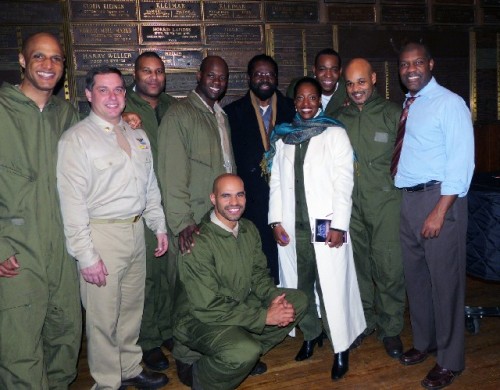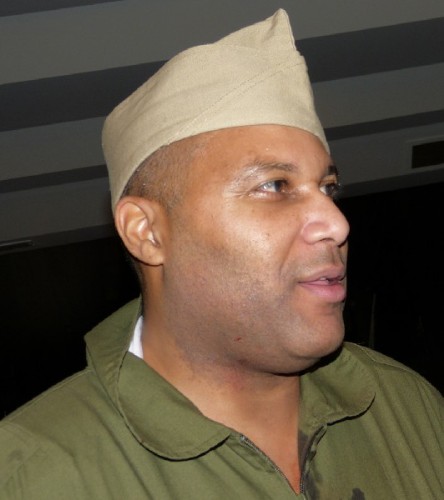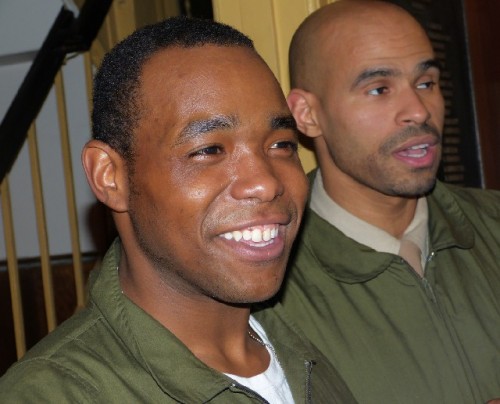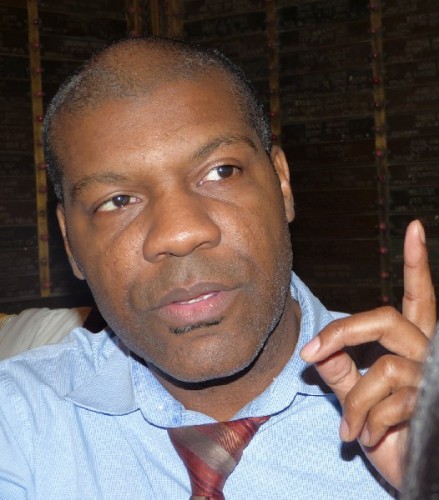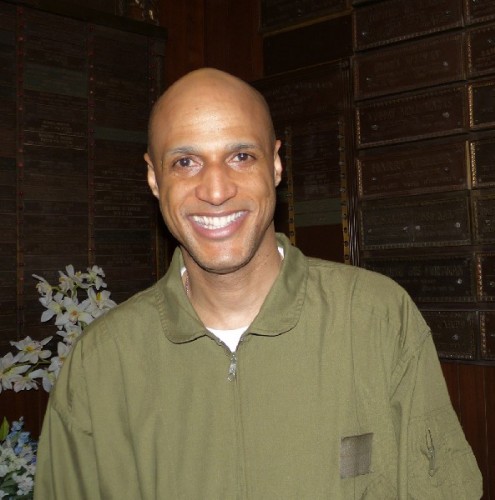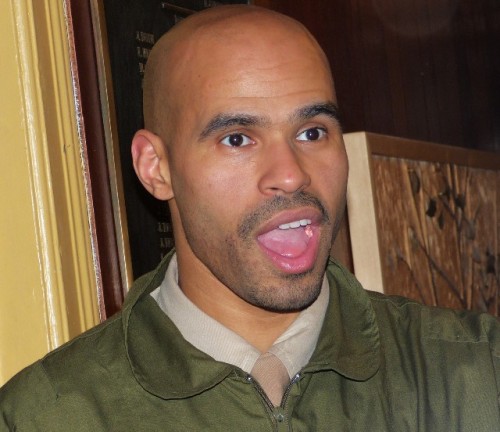Black Angels Over Tuskegee
Layon Gray’s Play in Third Year Off Broadway
By: Charles Giuliano - Dec 18, 2012
Black Angels Over Tuskegee
By Layon Gray
Directed by Layon Gray
Set Design, Josh Iacovelli; Light Design, David W. Boykins; Costume and Wardrobe, Jason McGee, Choreography/ Movement, Layon Gray, Sound Design, Aidan Cole
Cast: Man, Thaddeus Daniels; Quenten, Layon Gray; Abe, Thom Scott II; Elijah, Delano Barbosa; Theodore, Ananias Dixon; Jeremiah, Melvin Huffnagle; Percival, David Roberts; Major Roberts, Craig Colasanti
St. Luke’s Theatre
308 West 46th Street
Running time 2 hours and 10 minutes with intermission
Mon. Fri. and Sat., 8 PM and Sun., 5 PM
212 239 6200 or 800 423 7250
Now in its third year at St. Luke’s Theatre the riveting drama by Layon Gray Black Angels Over Tuskeegee is near to and yet so far from Broadway. In a conversation with Gray in an audience meet and greet, the playwright/ director/ actor/ choreographer indicated that there is progress in making that move.
With a Spartan set and superb cast, for me, Gray’s tightly woven, two act drama knocked it out of the park. It was a response shared by a relatively small, but wildly enthusiastic audience.
For Gray, who has written a number of plays all of which have been self produced, this is a great story that just had to be told. Yesterday, I viewed another version of the Tuskegee Airmen, the film, Red Tails, on HBO. Gray focuses on a more intimate view of the humanistic struggles of six black men (or Negroes in the language of the 1940s) striving to overcome Jim Crow racism in the military and kill Nazis.
To craft his play Gray sought out some of the survivors of the 332nd Fighter Group and the 477th Bombardment Group of the United States Army Air Corps. As he told me he was primarily interested in their camaraderie. Initially, they performed mop up missions in North Africa with mostly hand me down planes. They were not viewed as intelligent or competent enough to engage in combat.
That changed eventually because of devastating casualties to long range bombers. Their fighter escorts peeled off to engage in dog fights with German aviators. That left the bombers unprotected. Because of shortages of trained pilots, reluctantly the 332nd Fighter Group was given a probationary, skeptical opportunity. Ordered to stick closely to the bombers during missions deep into Germany losses dropped significantly.
Proving effective in combat their equipment was significantly upgraded to Republic P-47 Thunderbolts (June–July 1944), then the North American P-51 Mustang (July 1944). When the pilots of the 332nd Fighter Group painted the tails of their P-47s and later, P-51s, red, the nickname "Red Tails" was coined. Bomber crews applied a more effusive "Red-Tail Angels."
It is a truly remarkable and little understood chapter of World War II.
The story is introduced in a prologue warmly conveyed by Man, Thaddeus Daniels. He returns at the end of the play with a too rushed summary of the six men who we first meet taking a preliminary test in Utah.
Act One is set in a cold, unheated room in the dead of winter. Left on their own, with text books to study, the men wait for several hours before being given the first of many tests. They all passed and moved on to flight training in Tuskegee, Alabama. By the end of the war there were some 1,000 trained pilots.
Through pressure from the NAACP the military had reluctantly agreed to create an all black squadron of pilots. It was set up and fated to be a failed experiment. The requirements and training were more intense than that imposed on white recruits.
While waiting to take a qualifying exam we come to meet the six men and their different personalities. They range from a big city hipster, Abe (Thom Scott II) a loud mouthed zoot-suiter and showboater. He has all the moves in contrast to his more sober, half brother, an aspiring writer, Quenten (Gray). His journals, passed along to his son (the mother died in childbirth) become the basis for the play. The play ends with the death of Quenten which is beautifully staged and performed by Gray. There wasn’t a dry eye in the house.
There is a shy, country boy (Ananias Dixon) who has secretly brought along some of his favorite jazz 78s by Fats Waller, Billie Holiday and the Big Bands. The feisty, alpha male Elijah (Delano Barbosa) is a former prize fighter turned teacher. He boxed to earn money for school but gave it up because he got sick of two Negroes knocking each other’s brains out for the entertainment of the white man. Percival, a mediator, is played by David Roberts.
Getting to know each other the men jostle, entertain each other, and make the most of a bad situation. They are sharply reprimanded by Jeremiah (Melvin Huffnagle) who is trying to study. He makes it clear that he has a singular purpose to excel and emerge as the top gun of the group. In a poignant revelation we learn why he seeks no friends. His anger is a flashpoint for the drama.
In order to qualify for Tuskeegee all of the men were required to have college degrees. These range from pre law and education to agriculture.
They must also be physically fit. That becomes a sticking point when, just prior to the arrival of the white Major Roberts (Craig Colsanti), Quenten is stricken by a seizure. Abe hovers over, protects, and talks him through it.
Jeremiah, of course, sees it as clear and present danger. Just what happens if Quenten has a seizure during combat? That would put the entire group at risk.
One can not overstate the excellence of the ensemble acting. The direction and choreography of Gray are crisp and precise. There are fine individual performances which mesh seamlessly as a group.
The movement is wonderfully spontaneous particularly when they break out in song and dance. This aptly reflects an era steeped in great American jazz.
Given the relatively small audience Gray admitted the struggle of keeping the play together for the past three years. It has won numerous awards and has played to many church, school, and civic groups.
This is a heart warming, wonderful drama that truly deserves a shot at Broadway. Remember the name, Layon Gray. As a playwright, director, and actor he is a triple threat destined to break out big time.
For an entertaining, intimate, insightful evening of theatre it doesn’t get much better than Black Angels Over Tuskegee.

